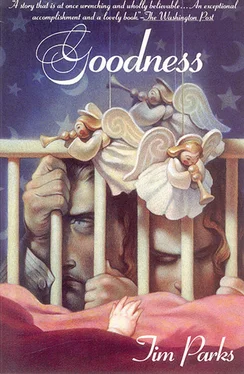Despite the wave of anger that rises boiling inside — this is my child after all — I nevertheless have to struggle to suppress the first dim inkling that Charles is right.
‘Better for absolutely everybody,’ he is saying. My grip tightens on the steering wheel.
By the time I drop off Charles and pull up in Gorst Road I’m thoroughly keyed up. But Mother is out at her Asian women’s conversation group. For some reason this annoys me intensely. She should be around at a moment like this. Not out showing solidarity to another minority group.
So I set about Grandfather. I set about him at once. I don’t think at all. He’s sitting in front of the television, as he might have been twenty years ago, sucking liquorice, poking about in his pipe, his belt unbuckled, his waistcoat, his hairy porish face. Walking in, I’m swept by a feeling of staleness and frustration. This is the mollusc shell I never really left somehow.
With no preamble I put it right to him: ‘Didn’t you ever ask yourself what was wrong with Mavis?’
I cross over and snap off the television. ‘Didn’t you?’
‘Mavis?’
‘Didn’t you ever wonder why she was so dumb?’
I shout. I suppose really I’m still reeling from the blow, it still hasn’t come home to me. And in a way I’m enjoying this reeling, this disorientation, knowing that it amounts to little more than a grace period before I’ll be obliged to get on with things and make decisions.
Perfectly lucid, he says: ‘What on earth are you on about Mavis for? Do we have to pay something?’
‘Mavis had a syndrome!’ I scream.
It’s infuriating, but the fact that you have to shout at him anyway because of his deafness, neutralises any effect volume would have on a normal person. It’s like beating fists on a wall.
‘You what?’ He squints.
‘I said a syndrome. A genetic fucking illness. And you should have found out.’
The room is staler than ever. The old man has cakecrumbs all over his lap. I think: this should have been over years ago, years and years ago, the stale farce of this pissy old man in this never-to-be-refurnished room. My mother has kept it going beyond all reason, because of her selflessness, her refusal to start a new, fresh, cheerful life. Dimly I sense that this is what is to blame for Hilary. This decaying, stinking existence is touching mine, tainting mine, dragging me down. Or that’s how it feels. As if Mother were keeping those bad genes alive on purpose, because for Mother life, however awful, is everything.
He says in a growl: ‘Our Mavis was all right till she took up with that Mormon fellah. She brought home a decent wage. Anyway, how’s Peggy? Never bothers to visit, the little
‘I said, Mavis had a syndrome and now my kid’s got the same thing only a million times worse. Do you understand or don’t you?’
His wrinkled, limp-balloon face stares. His Adam’s apple shifts. Then, grinning foolishly, pushing his tongue about in slack cheeks, he tells me: ‘Stick the kettle on, will you? I could do with a cuppa.’
Almost raving now, and at the same time perfectly conscious of the mad futility of what I am about, I begin to tell him what a completely useless, useless old sod he is. He had a deficient child and never bothered to find out why, never worried that the same thing might happen to his children, his grandchildren. For thirty years he sat around doing absolutely bugger all but eat and drink and smoke and wear my Mother to a rag. And now the last straw is that, having never been warned, without the faintest inkling, I’ve gone and had a child like Mavis, but worse than Mavis, I’m going to be dragged back into the same ugliness I fought so hard to get myself out of, just because I share the same stinking gene pool he gave me and nobody ever bothered to inform me about. Well at least he might have the decency now to lie down and fucking-well die and let those who know how to live get on with it without the burden of a filthy old albatross like him round their necks.
My blood is pumping. I have never shouted so loud.
‘You’re nuts.’ He heaves himself to slippered feet and tries to push past me. ‘You’re loony. Get yourself some pills.’
I push him back. He sits heavily.
‘I’ll kill you if you don’t listen.’
Even if he can’t really understand, at least he is fully aware now. At least he can see I hate him. His scabby old face begins to register a creeping alarm, veiny eyes squinting through gathering cataracts.
‘Can’t you see you’ve ruined my whole life? Ruined it.’
But words aren’t enough. I just can’t seem to make them mean anything of what I’m feeling. I stand and stare at him. And with that lucidity that lies like deep water beneath the foaming surface of my rage, it comes to me that this has always been the source of my frustration when I argue. Words just aren’t adequate. It isn’t about words. None of it.
So I hit him. Instinctively. I take a great swipe and let the fiat of my hand slap solid into his cheek. One is so unused to violence. He ducks his head down, yelling. I slap again and again. I kick his shin hard. In a sudden desperate movement, he jerks himself up and comes at me, arms flailing like an angry child, uncoordinated and helpless, cartoon-like. He lashes. I grab him by the shoulders and, throwing my whole weight against him, heave him bodily back. He collapses into his chair again, panting. I raise my hand to slap and he weakly pulls up an arm to defend himself. I brush the arm away and slap hard. We stare at each other, his old unhealthy face quivering with fear and incomprehension. God knows what I’m looking like.
Enunciating fiercely, I tell him, ‘Now if you don’t agree to go into a home, old man, if you don’t just leave my mother be, then I’m going to come here every week and beat hell out of you, okay. I’m going to beat you to a pulp. Now get upstairs and wash your face and stay out of my sight.’
Muttering under his breath, but definitely defeated now, he struggles to his feet and limps out into the passage and off upstairs.
Left alone, I find myself trembling and truly truly appalled. Resting against the mantelpiece, I pick up a dusty Hummel of a small boy and two yellow birds sitting together on a country fence, their mouths wide open in song. How my mother loves these quaint images of innocence and happiness. An ice-cream van tinkles in some suburban distance, exactly as twenty years ago. And I draw breath. I try to steady myself. I feel deeply justified in going for the old man, yet can’t escape the terrible ugliness of what I’ve done. Have I ever hit anybody before? Never. What am I sinking to? Yet the paradoxical pattern of this experience — justification followed by ugliness — is all too familiar (didn’t I feel much the same after cheating on my wife: justified, ugly).
When Mother comes back I burst into tears in her presence for the first time since childhood.
‘We were so so happy,’ I weep. ‘We’d really got so close together. Why did it have to happen? Why?’
Mother hugs me and repeats over and over: ‘Bless you, my dear heart, bless you, bless you, bless you, my dear heart.’
Later, driving home, I reflect that of course I only let rip with Grandfather so as not to have to do so with Mother. It was an easy way out. For in many ways it is more her fault than his. A generation on, it was she should have known what to do, her I should have been shouting at. Yet I know I never will.
I get home, transfer a Heinz curry and rice from freezer to microwave, and while that’s cooking look up Christensen’s syndrome in the medical book I bought. Of one thousand eight hundred expensive pages, my baby girl’s condition merits only six lines:
Читать дальше












